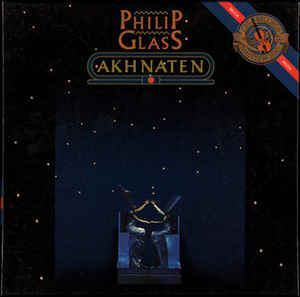 Akhnaten is the third of Philip Glass’ “portrait” operas, the three works based on historical figures who transformed the thinking of their times through their vision and ideas. Akhnaten’s claim to fame is that he introduced the idea of “god” as an abstract concept, divorced from the anthropomorphized (in the case of the Egyptian gods, at least partly so) deities that had been the norm.
Akhnaten is the third of Philip Glass’ “portrait” operas, the three works based on historical figures who transformed the thinking of their times through their vision and ideas. Akhnaten’s claim to fame is that he introduced the idea of “god” as an abstract concept, divorced from the anthropomorphized (in the case of the Egyptian gods, at least partly so) deities that had been the norm.
The opera traces Akhnaten’s reign, from the death of his father Amenhotep III to his own overthrow by an enraged priesthood. As is symptomatic of these three operas, there is no “story line” per se: Akhnaten is a series of vignettes and scenes inside a meta-narrative. The libretto is taken from documents of the Amarna Period, the period of Akhnaten’s reign, and sung in the original languages: Egyptian, Akkadian, and Biblical Hebrew. The documents are all, in one regard or another, fragmentary, and Glass has left it that way. A narrator provides a commentary/summary of the action in the language of the audience.
Although Glass says that his emphasis in Akhnaten is orchestral, I think that one has to take that as including chorus and soloists as part of the orchestra. Although each is highlighted at various places, one gets a distinct feeling of a sort of fundamental blending going on. The structure is characteristic of Glass’ music, the repetitive melodies, the incremental changes (although here the increments are sometimes large), marked also by passages of high tension, sometimes building slowly, as in the funeral music in the first scene (which follows two preludes): active, richly textured, and building a headlong momentum. (An early version of this section was included on the Dancepieces album; it’s different from the opera, but both are worth hearing — it’s tremendously exciting music.)
And speaking of funeral music, that’s the overarching image of the work: Amenhotep’s funeral. It opens the opera and recurs throughout as a motif. In the last scene, the deposed Akhnaten and his family, more ghosts than anything, join the funeral procession.
For those who might still be thinking of Philip Glass as a coldly intellectual composer based on his early minimalist works, all I can say is, you need to listen to this. Even more than in Satyagraha, there is real emotional depth, once again revealed through Glass’ gifts as a writer for the voice. It comes across perhaps most clearly in “The Family,” a scene that portrays Akhnaten with his wife and daughters, and as well in the Epilogue. There’s some haunting music there.
This is the 1987 recording by the Stuttgart State Opera, produced by Glass’ team of Kurt Munkacsi and Michael Riesman, who have taken all due care. Akhnaten has become one of my favorite works by Glass on the basis of this recording, and that should tell you something.
Personnel: Stuttgart State Opera Orchestra and Chorus, Dennis Russel Davies, cond.; Paul Esswood, countertenor; Melinda Liebermann, soprano; Milagro Vargas, contralto; Helmut Holzapfel, tenor; Tero Hannula, baritone; Cornelius Hauptmann, bass; Victoria Schneider, soprano; Lynne Wilhelm-Koniger, soprano; Maria Koupilova-Ticha, soprano; Geraldine Rose, contralto; Angelika Schwarz, contralto; David Warrilow, narrator; Christina Wachtler, contralto
(CBS Masterworks, 1987)
